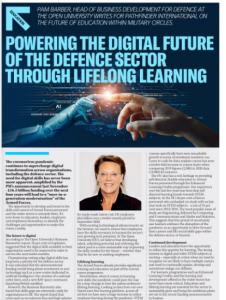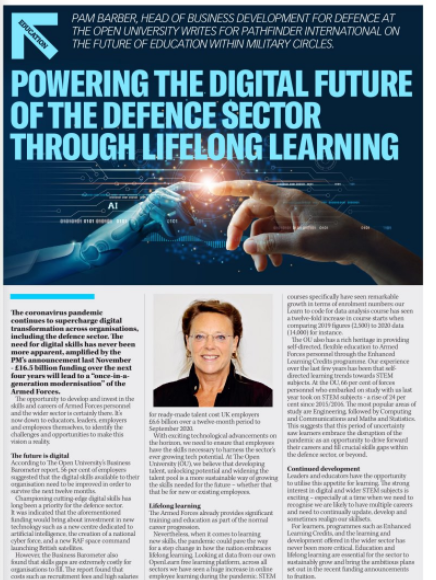Pam Barber, Head of Business Development for Defence at The Open University writes for Pathfinder International on the future of education within military circles.

The coronavirus pandemic continues to supercharge digital transformation across organisations, including the defence sector. The need for digital skills has never been more apparent, amplified by the PM’s announcement last November – £16.5 billion funding over the next four years will lead to a “once-in-a-generation modernisation” of the Armed Forces.
The opportunity to develop and invest in the skills and careers of Armed Forces personnel and the wider sector is certainly there. It’s now down to educators, leaders, employers and employees themselves, to identify the challenges and opportunities to make this vision a reality.
The future is digital
According to The Open University’s Business Barometer report, 56 per cent of employers suggested that the digital skills available to their organisation need to be improved in order to survive the next twelve months.
Championing cutting-edge digital skills has long been a priority for the defence sector. It was indicated that the aforementioned funding would bring about investment in new technology such as a new centre dedicated to artificial intelligence, the creation of a national cyber force, and a new RAF space command launching British satellites.
However, the Business Barometer also found that skills gaps are extremely costly for organisations to fill. The report found that costs such as recruitment fees and high salaries for ready-made talent cost UK employers £6.6 billion over a twelve-month period to September 2020.
With exciting technological advancements on the horizon, we need to ensure that employees have the skills necessary to harness the sector’s ever growing tech potential. At The Open University (OU), we believe that developing talent, unlocking potential and widening the talent pool is a more sustainable way of growing the skills needed for the future – whether that that be for new or existing employees.
Lifelong learning
The Armed Forces already provides significant training and education as part of the normal career progression.
Nevertheless, when it comes to learning new skills, the pandemic could pave the way for a step change in how the nation embraces lifelong learning. Looking at data from our own OpenLearn free learning platform, across all sectors we have seen a huge increase in online employee learning during the pandemic. STEM courses specifically have seen remarkable growth in terms of enrolment numbers: our Learn to code for data analysis course has seen a twelve-fold increase in course starts when comparing 2019 figures (2,500) to 2020 data (14,000) for instance.
The OU also has a rich heritage in providing self-directed, flexible education to Armed Forces personnel through the Enhanced Learning Credits programme. Our experience over the last few years has been that self-directed learning trends towards STEM subjects. At the OU, 66 per cent of forces personnel who embarked on study with us last year took on STEM subjects – a rise of 24 per cent since 2015/2016. The most popular areas of study are Engineering, followed by Computing and Communications and Maths and Statistics. This suggests that this period of uncertainty saw learners embrace the disruption of the pandemic as an opportunity to drive forward their careers and fill crucial skills gaps within the defence sector, or beyond.
Continued development
Leaders and educators have the opportunity to utilise this appetite for learning. The strong interest in digital and wider STEM subjects is exciting – especially at a time when we need to recognise we are likely to have multiple careers and need to continually update, develop and sometimes realign our skillsets.
For learners, programmes such as Enhanced Learning Credits, and the learning and development offered in the wider sector has never been more critical. Education and lifelong learning are essential for the sector to sustainably grow and bring the ambitious plans set out in the recent funding announcements to fruition.
Taken from the April 2021 issue of Pathfinder International. Read the entire issue HERE for free.


